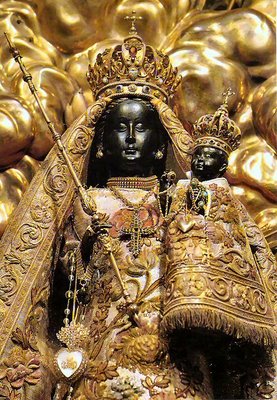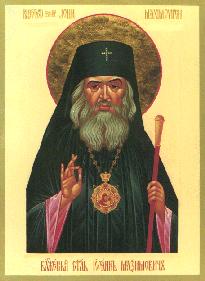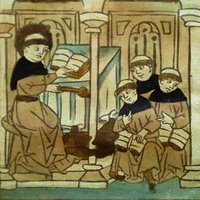Saturday, April 29, 2006
"When under the pressure of stupid thoughts, we will find relief and joy by rebuking ourselves truthfully and unemotionally, or by confessing everything to the Lord as to a human being. In both these ways we will always find tranquility, whatever troubles us." --St. Hesychius from the Philokalia, Volume One. Quoted from "Christ the Eternal Tao."
All Saints of Cluny Monastery
 Today, on April 29, we commemorate all the Benedictine Saints of the Monastery of Cluny in the Burgundy region of France, among whom are the three great Abbots, Sts. Odo, Majolus, and Odilo.
Today, on April 29, we commemorate all the Benedictine Saints of the Monastery of Cluny in the Burgundy region of France, among whom are the three great Abbots, Sts. Odo, Majolus, and Odilo.To honor them, the Vespers hymn proper to their feast:
The joyous festival again
Returns, of those renowned men,
Our Fathers, who with honest heart
The world rejected, for their part.
We celebrate their yearly feast
With bright solemnity: and least
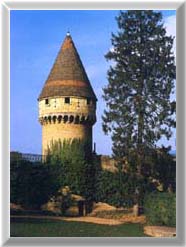 Among their followers, we pray
Among their followers, we prayTheir help to purge our stains away.
By earnest supplication now,
And subject to our solemn vow,
O may their intercession win
A tender pardon for our sin.
All laud to God the Father be;
All praise eternal Son to Thee;
All glory as is ever meet,
To God the Holy Paraclete. Amen.
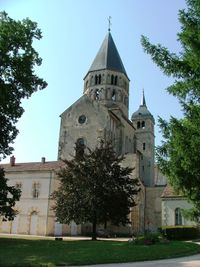 Collect:
Collect: Let us pray. O God, Who dost gladden us by the festival of all Thy Saints of Cluny and dost urge us to advance by imitating them, grant that as we venerate them with our homage we may also follow in the example of their holy life. Through our Lord Jesus Christ, Who liveth and reigneth with Thee and the Holy Spirit, ever one God, unto ages of ages. Amen.
[Liturgical texts from the Farnborough Monastic Diurnal with some edits.]
Friday, April 28, 2006
Salve festa dies
I found an mp3 recording of St. Venantius Fortunatus' "Salve Festa Dies" in Gregorian Chant. Here it is.
According to the Web site home page, it's sung by the Benedictine Monks of the Abbey Saint-Maurice and Saint-Maur at Clervaux [Clairvaux?], recorded in Luxemburg in 1960.
Enjoy.
According to the Web site home page, it's sung by the Benedictine Monks of the Abbey Saint-Maurice and Saint-Maur at Clervaux [Clairvaux?], recorded in Luxemburg in 1960.
Enjoy.

"Rejoice, O little and suffering Orthodoxy, hated by all..." (Doxastikon of the Litiya for St. John Maximovitch)
You can get your very own sweatshirt here.
Thursday, April 27, 2006
Healing the Soul
Much of this past Lent, I had been agonizing over someone who was dealing with difficult temptations. I had been praying for this person frequently, asking the intercessions of many Saints. I was in a lot of doubt over whether my prayers were being heard. I knew that God listens attentively to every prayer and that His Saints, in immitation of Him, are also quick to hear. But I was still troubled and depressed.
So, on Good Friday, one of my favorite days of the liturgical year, I asked my spiritual father about how to pray for this person. My problem, in general, was that I was needlessly weighing myself down. My spiritual father told me that, when we pray for someone, we should simply commend them to God, Who knows everything and loves each person infinitely. Prayer for specific things can lead us to pride. It is far better (and easier on our souls) to commend one another and ask that God's will be done.
Having quieted my soul upon receiving this bit of instruction, my burden left me. Last night, I read this little passage from a very good book by Hieromonk Damascene of St. Herman of Alaska Monastery in California (Serbian Patriarchate) called "Christ the Eternal Tao." Here is what I read, a section called "Healing Through Non-Action," on pgs. 324-325.
--------------------------------------------------------------------------------
"Lao Tzu [the ancient Chinese philosopher who wrote about the Tao, or the Way] understood that the true healing of our spirits comes not as a result of outside pressures, that is, of being constantly told to be kind, good, generous, etc. Rather, it comes from within--from returning to our true nature by ever returning to our Creator. Therefore he wrote:
In practicing non-action, we do not try to heal ourselves; rather, we allow ourselves to be healed by the Way. We do not ambitiously strive to get rid of our problems, for when we return to our original nature by connecting with the Way, we find that our problems find their own solution, spontaneously.
In this way we can also lead others to their original nature--to where they have fallen from. And we will do so without having to apply pressure; we will allow them to find on their own the true Source of the spirits's healing. As Lao Tzu stated:
--------------------------------------------------------------------------------
To order "Christ the Eternal Tao" (Valaam Books, Second ed.--2002) from St. Herman of Alaska Press, and to see a brief book description, click here.
So, on Good Friday, one of my favorite days of the liturgical year, I asked my spiritual father about how to pray for this person. My problem, in general, was that I was needlessly weighing myself down. My spiritual father told me that, when we pray for someone, we should simply commend them to God, Who knows everything and loves each person infinitely. Prayer for specific things can lead us to pride. It is far better (and easier on our souls) to commend one another and ask that God's will be done.
Having quieted my soul upon receiving this bit of instruction, my burden left me. Last night, I read this little passage from a very good book by Hieromonk Damascene of St. Herman of Alaska Monastery in California (Serbian Patriarchate) called "Christ the Eternal Tao." Here is what I read, a section called "Healing Through Non-Action," on pgs. 324-325.
--------------------------------------------------------------------------------
"Lao Tzu [the ancient Chinese philosopher who wrote about the Tao, or the Way] understood that the true healing of our spirits comes not as a result of outside pressures, that is, of being constantly told to be kind, good, generous, etc. Rather, it comes from within--from returning to our true nature by ever returning to our Creator. Therefore he wrote:
When the great Tao [Christ, the Way] is forgotten,
Kindness and morality arise...
When there is no peace withing the family,
Filial piety and devotion arise...
These are outward forms alone; they are not sufficient in themselves.
It is more important
To see simplicity,
To realize one's true nature,
To cast off selfishness
And temper desire.
In practicing non-action, we do not try to heal ourselves; rather, we allow ourselves to be healed by the Way. We do not ambitiously strive to get rid of our problems, for when we return to our original nature by connecting with the Way, we find that our problems find their own solution, spontaneously.
In this way we can also lead others to their original nature--to where they have fallen from. And we will do so without having to apply pressure; we will allow them to find on their own the true Source of the spirits's healing. As Lao Tzu stated:
The sage brings people back to what they have lost.
He helps the ten thousand things find their own nature,
But does not venture to lead them by the nose."
--------------------------------------------------------------------------------
To order "Christ the Eternal Tao" (Valaam Books, Second ed.--2002) from St. Herman of Alaska Press, and to see a brief book description, click here.
New Name, New Mission, Same Address, Same Blogger
(Madison--April 27) The blog formerly known as "Orthodox Tidings" has a new name and a new focus. Now called "Einsiedeln," it is part of a new blogging trend whereby mysterious, obscurantist names or phrases substitute for the usual fare of "My Own Ramblings," "Daily Diversions," and "Objectively Onerous Opinions." Many even in the Orthodox Christian blogging community, as well-known for its loathing of fad-laden modernity as for its utter doctrinal and liturgical pomposity, have put one foot on-board the new e-trend bandwagon while keeping another foot firmly planted in the Dark Ages. Some Orthodox bloggers, however, do not see things in the same light.
One such blogger, known only by the weird pseudonym of "Eric John," claims to have changed the name of his blog for a completely different reason.
"Well, I did it because I have another blog on Xanga and I really just wanted to work on one blog and use it to write about all the things I'm interested in. My Blogger blog was called 'Orthodox Tidings,' but I thought the title and the scope of it were too narrow for what I wanted to talk about and there was also the notion that people who didn't know better could mistake my personal blog for something official, like I was speaking for the Orthodox Church. So I wanted to avoid that on one hand and expand my blogging topics on the other....," Eric John said. (Actually, he continued talking after this, but this intrepid reporter had had enough.)
So, there you have it. New blogging trends threaten to drag the Orthodox blogger kicking and screaming into the heretical future. What will this mean for the rest of the world? Does the rest of the world even care? Will the rest of the world even read this article? These are weighty questions indeed.
One such blogger, known only by the weird pseudonym of "Eric John," claims to have changed the name of his blog for a completely different reason.
"Well, I did it because I have another blog on Xanga and I really just wanted to work on one blog and use it to write about all the things I'm interested in. My Blogger blog was called 'Orthodox Tidings,' but I thought the title and the scope of it were too narrow for what I wanted to talk about and there was also the notion that people who didn't know better could mistake my personal blog for something official, like I was speaking for the Orthodox Church. So I wanted to avoid that on one hand and expand my blogging topics on the other....," Eric John said. (Actually, he continued talking after this, but this intrepid reporter had had enough.)
So, there you have it. New blogging trends threaten to drag the Orthodox blogger kicking and screaming into the heretical future. What will this mean for the rest of the world? Does the rest of the world even care? Will the rest of the world even read this article? These are weighty questions indeed.
Tuesday, April 25, 2006
St. Venantius Fortunatus
Here are some links to learn more about St. Venantius Fortunatus:
Link I
Link II
Link III
Hear and read some of his hymns at the Cyber Hymnal
Link I
Link II
Link III
Hear and read some of his hymns at the Cyber Hymnal
Monday, April 24, 2006
Sing to the Lord a new song!
CHRIST IS RISEN! INDEED, HE IS RISEN!
I wish you all a joyous Easter!
In order to more splendidly celebrate the glorious and life-giving Resurrection of Christ our God, I'll be posting some favorite Paschal hymns. Enjoy!
---------------------------------------------------------
Hail thee, Festival Day!
Blest day to be hallowed forever;
God, Who hath conquered hell,
Riseth again from the dead.
Lo, the fair beauty of earth,
From the death of the winter arising,
Every good gift of the year
Now with its Master returns.
Hail thee, Festival Day!
Blest day to be hallowed forever;
God, Who hath conquered hell,
Riseth again from the dead.
He Who was nailed to the Cross
Is God and the Ruler of all things;
All things created on earth
Worship the Maker of all.
Hail thee, Festival Day!
Blest day to be hallowed forever;
God, Who hath conquered hell,
Riseth again from the dead.
God of all pity and power,
Let Thy word be assured to the doubting;
Light on the third day returns;
Rise, Son of God, from the tomb!
Hail thee, Festival Day!
Blest day to be hallowed forever;
God, Who hath conquered hell,
Riseth again from the dead.
Rise now, O Lord, from the grave
And cast off the shroud that enwrapped Thee;
Thou art sufficient for us:
Nothing without Thee exists.
Hail thee, Festival Day!
Blest day to be hallowed forever;
God, Who hath conquered hell,
Riseth again from the dead.
Mourning they laid Thee to rest,
Who art Author of life and creation;
Treading the pathway of death,
Life Thou bestowest on man.
Hail thee, Festival Day!
Blest day to be hallowed forever;
God, Who hath conquered hell,
Riseth again from the dead.
Show us Thy face once more,
That the ages may joy in Thy brightness;
Give us the light of day,
Darkened on earth at Thy death.
Hail thee, Festival Day!
Blest day to be hallowed forever;
God, Who hath conquered hell,
Riseth again from the dead.
Out of the prison of death
Thou art rescuing numberless captives;
Freely they tread in the way
Whither their Maker has gone.
Hail thee, Festival Day!
Blest day to be hallowed forever;
God, Who hath conquered hell,
Riseth again from the dead.
Jesus has harrowed hell;
He has led captivity captive:
Darkness and chaos and death
Flee from the face of the Light.
Hail thee, Festival Day!
Blest day to be hallowed forever;
God, Who hath conquered hell,
Riseth again from the dead.
Text: "Salve festa dies," by St. Venantius Fortunatus (circa 540-600), translated by M.F. Bell (1862-1947), altered.
Meter: Irregular.
Source: St. Ambrose Hymnal, published by St. Gregory the Great Antiochian Church--Western Rite Vicariate, 2001.
Note: I would very much like to know if there's a Western ecclesiastical chant melody (Gregorian, Sarum, Mozarabic, Ambrosian, etc.) which works well with this text.
I wish you all a joyous Easter!
In order to more splendidly celebrate the glorious and life-giving Resurrection of Christ our God, I'll be posting some favorite Paschal hymns. Enjoy!
---------------------------------------------------------
Hail thee, Festival Day!
Blest day to be hallowed forever;
God, Who hath conquered hell,
Riseth again from the dead.
Lo, the fair beauty of earth,
From the death of the winter arising,
Every good gift of the year
Now with its Master returns.
Hail thee, Festival Day!
Blest day to be hallowed forever;
God, Who hath conquered hell,
Riseth again from the dead.
He Who was nailed to the Cross
Is God and the Ruler of all things;
All things created on earth
Worship the Maker of all.
Hail thee, Festival Day!
Blest day to be hallowed forever;
God, Who hath conquered hell,
Riseth again from the dead.
God of all pity and power,
Let Thy word be assured to the doubting;
Light on the third day returns;
Rise, Son of God, from the tomb!
Hail thee, Festival Day!
Blest day to be hallowed forever;
God, Who hath conquered hell,
Riseth again from the dead.
Rise now, O Lord, from the grave
And cast off the shroud that enwrapped Thee;
Thou art sufficient for us:
Nothing without Thee exists.
Hail thee, Festival Day!
Blest day to be hallowed forever;
God, Who hath conquered hell,
Riseth again from the dead.
Mourning they laid Thee to rest,
Who art Author of life and creation;
Treading the pathway of death,
Life Thou bestowest on man.
Hail thee, Festival Day!
Blest day to be hallowed forever;
God, Who hath conquered hell,
Riseth again from the dead.
Show us Thy face once more,
That the ages may joy in Thy brightness;
Give us the light of day,
Darkened on earth at Thy death.
Hail thee, Festival Day!
Blest day to be hallowed forever;
God, Who hath conquered hell,
Riseth again from the dead.
Out of the prison of death
Thou art rescuing numberless captives;
Freely they tread in the way
Whither their Maker has gone.
Hail thee, Festival Day!
Blest day to be hallowed forever;
God, Who hath conquered hell,
Riseth again from the dead.
Jesus has harrowed hell;
He has led captivity captive:
Darkness and chaos and death
Flee from the face of the Light.
Hail thee, Festival Day!
Blest day to be hallowed forever;
God, Who hath conquered hell,
Riseth again from the dead.
Text: "Salve festa dies," by St. Venantius Fortunatus (circa 540-600), translated by M.F. Bell (1862-1947), altered.
Meter: Irregular.
Source: St. Ambrose Hymnal, published by St. Gregory the Great Antiochian Church--Western Rite Vicariate, 2001.
Note: I would very much like to know if there's a Western ecclesiastical chant melody (Gregorian, Sarum, Mozarabic, Ambrosian, etc.) which works well with this text.

